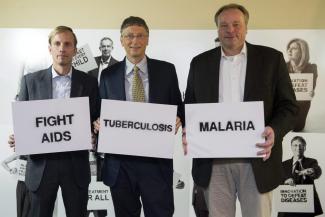Multilateral policymaking
Quantum leap

The Millennium Declaration that was passed by the United Nations in the year 2000 was visionary. The Declaration was the foundation for the Millennium Development Goals, which have shaped development cooperation more than most previous international agendas thanks to their proven mobilising force. They made fighting poverty and boosting human development focal issues of international cooperation, so considerable progress was achieved in many disadvantaged countries and even fragile states.
There are downsides too, however. Some MDGs will not be achieved. This mixed MDG experience, including cases of success as well as failure, should motivate us to agree on a new global set of development goals for the years beyond 2015. These goals will have to link development issues to sustainability. The reason is that development opportunities are dwindling as droughts are becoming more frequent and ecosystems are being depleted. Where people struggle for their very survival, nature conservation is normally no priority. In order to achieve sustainability, established industrial powers, emerging markets and developing countries must all improve the way they run their economies. Otherwise the quantum leap we need will prove impossible.
The new development goals will not be drafted in a vacuum. We already have several international agreements on development, human rights and the environment. These agreements are a solid foundation that must not be re-negotiated. Nor do we need to debate scientifically accepted insights into the limits of what our ecosystems can deliver – in regard to the climate, the ozone layer, resource depletion, deforestation, overfishing or the loss of biodiversity.
Great fortes have so far marked the MDG agenda. The MDGs make sense to everyone, so they are easy to communicate. They are quantified and refer to a precisely defined time span. They are based on a cross-cutting and comprehensive idea of development. They point the way forward, but leave policymaking to sovereign nations.
The next set of development goals should similarly be marked by these fortes. At the same time, the weaknesses of the MDG agenda must be addressed. They include the out-dated dichotomy of donor and recipient countries. Development aid is a thing of the past, what we need is real cooperation at eye level. In 2000, moreover, important issues such as peace and security were not made part of the agenda at all, and others, such as environmental sustainability, were only tackled inadequately.
Besides quantitative indicators for goal achievement, we will also need a qualitative approach in the future. The actual developmental impact of all measures needs to be at the core of assessments. After all, the new goals are not only meant to be ambitious at the global level, but at national levels as well. Accordingly, the goals must be specified for every single country. Nations that already are on a healthy, self-sustaining trajectory should accept more demanding goals.
To build momentum, the new development goals must be appreciated beyond government circles. Governments are not the only relevant actors in development, so it is essential to involve the voices of civil society and the private sector, of mega cities and rural areas early on. In the past, inclusive consultation processes helped to boost the popular legitimacy of ambitious goals. I believe United Nations is the place for organising such a participatory process and considering the new development goals.
It is too early to propose draft versions for the new goals. Our debate, however, should certainly be guided by three principles that marked the Millennium Declaration: human rights, equal opportunity and sustainability. These principles should be reflected in the four dimensions of social development and equal rights, environmental sustainability, economic development and, last but not least, peace and security.
I am convinced that intelligently designed goals, broad-based participation and relevance in terms of dignified human life compatible with the carrying capacity of our planet will serve to mobilise the international community even more than before. The overarching goal is to give all human beings the chance, today and tomorrow, to live a life free of need.
The new development goals must not simply spell out what, to judge by long-term trends, would be achieved anyway by business as usual. We want to move on to a higher-value development path! In order to do so, we need to muster the political will, and we must debate whether additional resources are needed and who will provide them. Funding questions, however, do not arise now, they will do so once the goals have been defined. In this regard too, we will have to be innovative.
Outdated dichotomy
The old donor-recipient dichotomy is outdated. New donors are emerging – ranging from newly industrialising countries to the private sector, from philanthropy to civil society. Many developing countries, moreover, have ample domestic resources they have not really tapped yet. Illegal capital outflows, black money and corruption deprive many nations of the means they need to drive their own development.
An instinctive demand for more money from the OECD nations would not be up to the complexity of the challenges we face. Many measures that contribute to sustainable global development by generating growth, jobs and government revenues, moreover, do not fit the OECD definition of official development assistance (ODA) because they are funded by the private sector or because they rely on government guarantees instead of government loans and grants.
Today, the majority of the world's poor live in countries that are in a position increasingly to fund their own development. Obviously, we all need good, development-oriented cooperation, but we must update our toolkit. Germany can support many of the countries concerned with market-like credit for investments along with the transfer of knowledge and advice on how to gear society towards sustainability and towards a social and environment-friendly market economy. Accordingly, our grants for standard development projects will be channelled to the least developed countries which, according to generally accepted indicators, need such funding most.
I don't want to be misunderstood: yes, we certainly need public funds for development purposes. But what we need most is innovative mechanisms to make governmental development finance an even more effective catalyst for mobilising resources from the private sector and other quarters to drive sustainable development at the global level.
Our development policy, moreover, is not just about supporting the development efforts of poorer countries. In order to succeed, we must also consider the impacts of our domestic policymaking and multilateral agreements. Coherence is of the essence.
The world trade order, for example, should be made more development friendly. Developing countries' revenues from international trade and foreign investments by far exceed ODA. Accordingly, development opportunities typically depend on how we regulate international trade and investments and on what market access the EU grants and what agricultural subsidies it pays. We need to think coherently and act accordingly, and that applies to business, civil society in a broad sense as well as to all UN organisations and all departments of national governments.
The MDG agenda as defined in 2000 has essentially been a tremendous success, which serves as a motivation to define even more ambitious goals for the years after 2015. At the same time, we have to pay more attention to sustainability in regard to economic growth, effective ODA, an up-to-date approach to assessing development results and the reform of international trade.
We consider human rights the non-negotiable basis. We want a world free of need – and not just in the sense of material need. We want freedom from oppression, freedom from discrimination and freedom from fear. Well-drafted development policy results in the freedom to live a self-determined life in dignity and in tune with our ecosystems. The negotiation of new development goals will offer an opportunity to move on to a higher-value development path. The talks will probably take a long time and prove complicated. They will require passion and endurance. I am convinced, however, that successful negotiations will improve the lives of billions of people – and that is certainly worth any effort.
Dirk Niebel is Germany's federal minister for economic cooperation and development.
http://www.bmz.de/en








